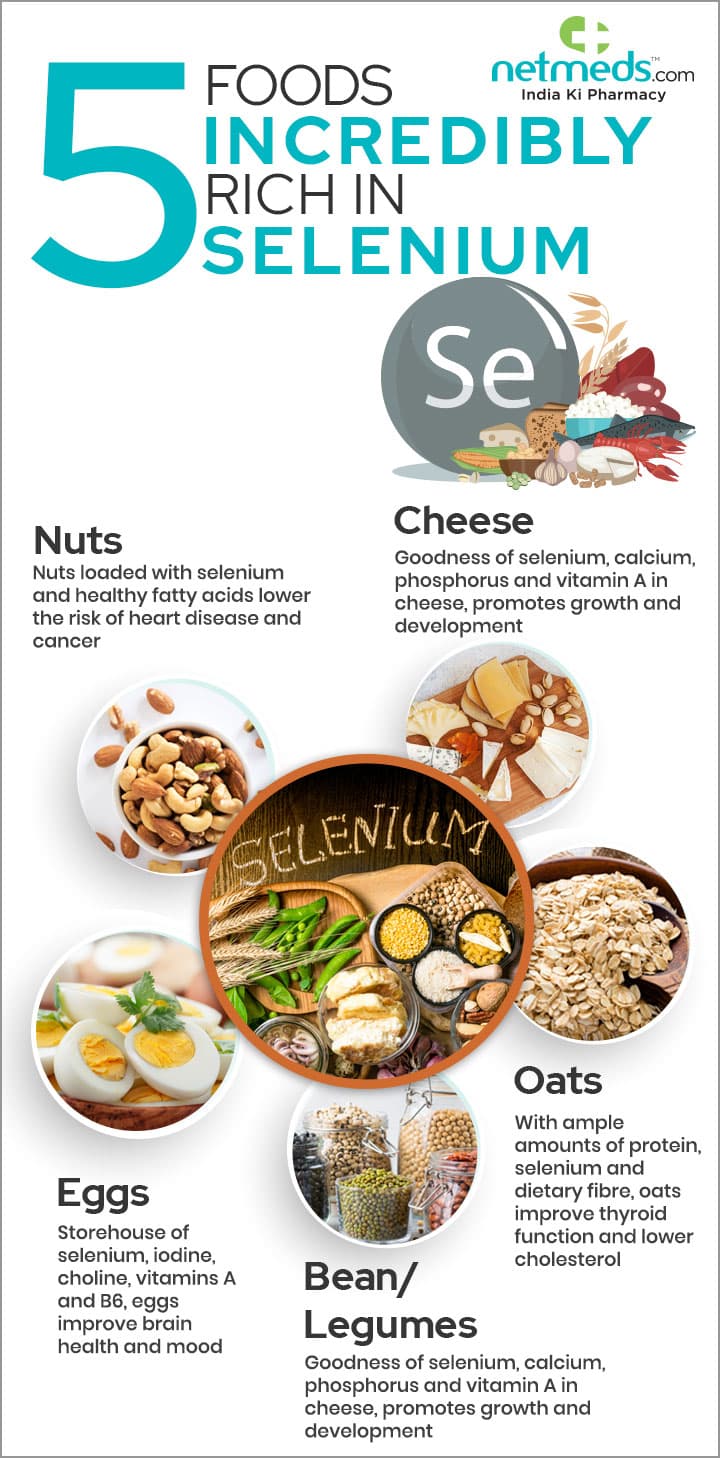
Selenium is an essential trace mineral that is required for a number of functions in the body. Read on to find out more about its properties and how you can ensure that you are getting the right levels.
What is Selenium?
Selenium is an essential mineral that is vital for good health, but the body only requires it in small amounts. Besides assisting in protein synthesis, it maintains thyroid health by ensuring proper thyroid hormone metabolism and protecting the body's cells against oxidative damage. Selenium contains anti-ageing and antioxidant properties and has the ability to help the body eliminate free radicals as well as toxic minerals such as mercury and lead.
It is vital that the body maintains sufficient selenium levels through dietary sources to fight infections. This important mineral stimulates antibody response to infection, promotes energy levels, assists in the production of healthy sperms in males, and helps to alleviate menopausal symptoms in women. In certain cases, it has been shown to help with fighting cold sores and shingles, both caused by the herpes virus.
Meeting the recommended dietary allowance for selenium can also help treat arthritis and multiple sclerosis, as well as prevent high blood pressure and cancer. Additionally, this mineral is necessary for the elasticity of tissue and pancreatic function. Furthermore, it helps make blood less sticky, which is key to preventing heart attacks and strokes.
Selenium deficiency can disrupt thyroid function or cause chronic diseases.
Sources of Selenium
Plant-based foods are the main source of selenium. How much selenium the food contains depends on the amount of selenium in the soil in which it is grown, or animals are raised. Selenium can also be found in some meats and seafood. Animals that eat grains or plants grown in soils with a high concentration of selenium will have higher amounts of selenium in their muscle.
Excellent sources of selenium include:
- Brazil nuts
- Tuna
- Beef
- Eggs
- Whole grains like brown rice and wheat germ
- Enriched breads
- Seafood like shellfish and oysters
- Sunflower seeds
Source: netmeds.com
A selenium supplement should be taken under a doctor's supervision as it can cause serious side effects in large doses.
The Recommended Daily Intake of Selenium
The recommended daily intake of selenium is 20 micrograms per day for children between 1 and 3. For children between 4 and 8, 30 micrograms of selenium is recommended. Between 9 and 13 years, it is 40 micrograms per day. Those 14 years and over should consume 55 micrograms of selenium per day. Pregnant women are advised to get 60 micrograms of selenium each day, while those who are breastfeeding should consume 70 micrograms every day.
Selenium Deficiency
Most people get the recommended daily intake of selenium from their daily diets, while others take dietary supplements. Selenium deficiency is rare but can occur in countries where the selenium content is low in the soil. Selenium deficiency increases the risk of heart disease, thyroid disease, and a weakened immune system. Low blood selenium levels can occur in people that rely on parenteral nutrition as their sole food source. This is a method of feeding a person nutrients through an IV line. Selenium deficiency or depletion can also occur in people that suffer from severe gastrointestinal disorders.
It is important to consume foods with selenium every day. Otherwise, insufficient selenium levels can cause not only cardiomyopathy, which is a form of cardiovascular disease. It can also lead to infertility, alopecia, seborrhoeic dermatitis, Keshan disease (cardiac disorder), Kashin-Beck disease (arthritis) or cancer.
The Danger of Too Much Selenium
A surplus of selenium is as harmful as a deficiency in the mineral. A daily intake of more than 100 micrograms of selenium can result in selenosis, a condition caused by high plasma selenium levels. Symptoms may include gastrointestinal upsets, hair loss, white blotchy nails, garlic breath odour, fatigue, irritability and mild nerve damage. Selenium toxicity is rare and the tolerable limit has been set at 400 micrograms per day for adults.
Selenium Supplementation
Selenium is present in staple foods such as corn and wheat as selenomethionine, the organic selenium analogue of the amino acid methionine. Selenocysteine is also organic. These are the best utilised form of selenium supplements as it can be incorporated into proteins in place of methionine and serves as a vehicle for selenium storage in organs and tissues. Other options include sodium selenite and sodium selenate – two non-organic forms. Selenium is also available in high selenium yeasts.
Now that you've learned the many health benefits of selenium, always ensure that it is a part of your healthy diet. By doing so, you can prevent cell damage, boost your immune system and avoid diseases. However, if you're not sure about the levels of selenium in your diet and fear the side effects of going overboard, consult your healthcare provider, nutritionist, dietitian or naturopath.
Originally published on Sep 25, 2008









